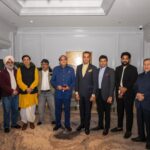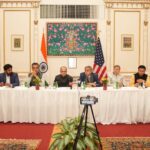Leader of the All-Party Parliamentary Delegation from India and former Minister of State for External Affairs, Member of Parliament Shashi Tharoor, described the delegation’s meetings with Guyana, Panama, Colombia, Brazil, and the United States as “very positive,” noting the reception was marked by “extraordinary warmth.”
Responding to a question from South Asian Herald about international engagement regarding Operation Sindoor, Tharoor said, “I think for us, what has been gratifying is the sense that not only did we get our message across, but we also discovered, through our presence, a reaffirmation of the value of India to the world…”
Speaking at a press conference at the Embassy of India on June 4, 2025, Tharoor recounted that the delegation had high-level meetings in Guyana, including with the President, Vice President, Prime Minister, and 11 members of the cabinet. He also highlighted the moment when Panama’s Foreign Minister, after publicly supporting India’s stance on the conflict, asked, “When can you bring an IIT to Panama?”
In Colombia, officials expressed keen interest in strengthening bilateral ties. The Vice President of Brazil, described by Tharoor as “incredibly warm and friendly,” expressed eagerness to deepen trade relations and visit India.
For the delegation, Tharoor mentioned, it was a “sort of rediscovery” – a realization of how deeply India is integrated into their economies, how significantly it contributes to their growth, and how clearly their willingness to collaborate with India has emerged.
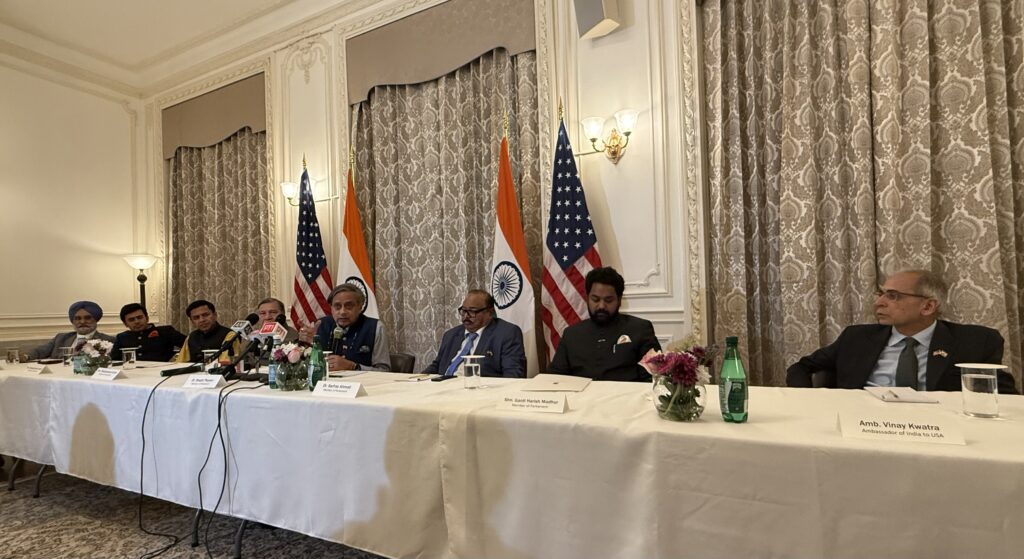
When asked by South Asian Herald about standout moments from the trip, MP Shashank Mani shared two personal highlights. Guyana featuring a Rabindranath Tagore song during their National Day celebrations for the delegation, and Colombian Congressman Juan Vargas expressing deep interest in Vedic culture, yoga, and spirituality, sharing that he got married at the Art of Living Center in Bangalore. “The reach of India culturally is far beyond than we imagined,” Mani noted.
MP Tejasvi Surya recounted a symbolic exchange in Panama where Tharoor gifted a Kashmiri shawl to the Speaker of the Panamanian Assembly, who reciprocated with a jaguar statue. “This is a symbol of a warrior. This is to give you strength in your fight against terrorism. This was how we were received everywhere,” she told Tharoor.
Former Indian Ambassador to the United States Taranjit Sandhu added that the President of Guyana quoted Rabindranath Tagore in his Independence Day speech.
Tharoor said the delegation would symbolically pay tribute to the statue of Mahatma Gandhi on June 5. “It’s a reminder to the world that we are a land of peace and non-violence. We don’t desire war, we don’t seek it, but if it is thrust upon us, we will face it with courage. And Mahatma Gandhi taught us all not to live in fear, and we will not live in fear,” he said.
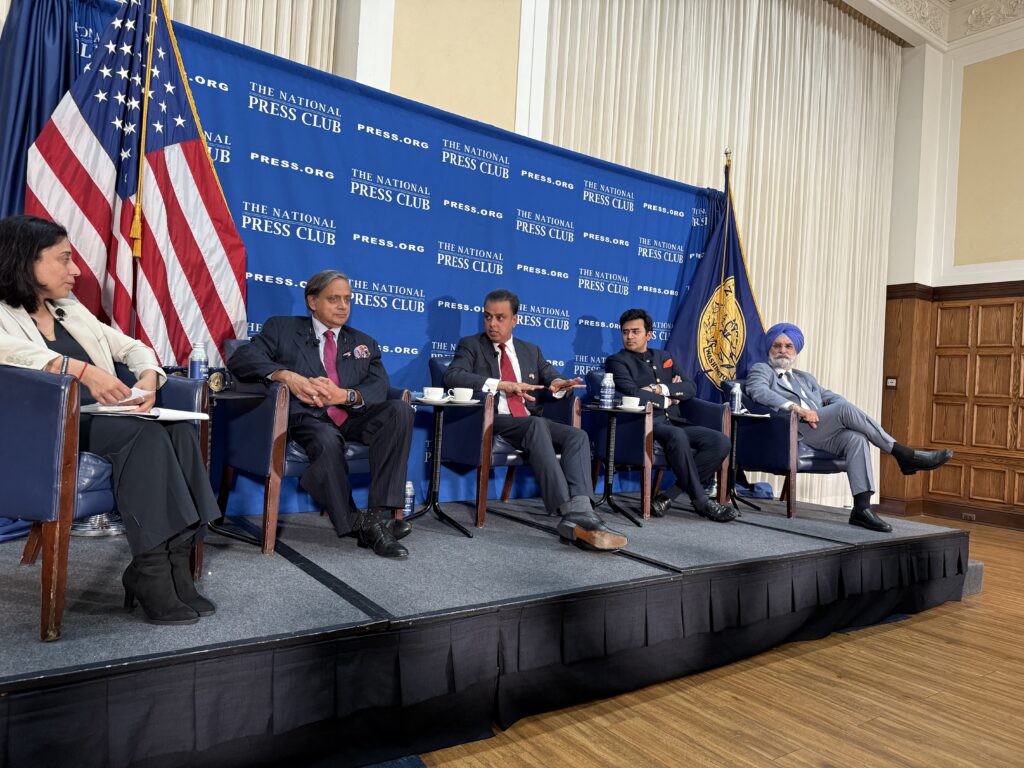
The delegation began its journey in the United States en route to Guyana, stopping at the 9/11 Memorial in New York to show solidarity with global victims of terrorism. “We have been extremely well received,” Tharoor said, noting that the delegation met top leaders in three countries. “What we found everywhere was that we got a very clear, unambiguous expression of not only understanding, but of solidarity for us and for our message.”
Tharoor also clarified that Colombia initially issued a “disappointing” statement during Operation Sindoor, expressing condolences for victims in Pakistan. “We were taken aback,” Tharoor said. After India conveyed its concerns during a press conference in Colombia, the country officially withdrew the statement the next day – a move Tharoor described as a “fine gesture.”
“Everyone is in favor of peace, and if you’re far, far away from a particular conflict, you will tend to just issue something fairly routine. And then when you have the context explained and the whole circumstances explained, you could see the better of it. And I think that was, again one of the benefits of this delegation,” he added in the context of Colombia.

On Capitol Hill, the delegation met with members of the Congressional Indian Caucus, House Foreign Affairs Committee, Senate Foreign Relations Committee, and others. Upcoming engagements included meetings with White House officials and think tanks in Washington, D.C.
“We didn’t have a single skeptical or negative voice. On the contrary, what we got was very positive responses,” Tharoor stated, emphasizing the “total support in solidarity for India’s fight against terrorism, and complete understanding of India’s right to defend itself against terrorism.”
He further noted that leaders across the Americas understood the delegation’s mission. Not only did they display empathy, but they also expressed tremendous interest in strengthening relations with India, thinking positively about economic development cooperation, trade, and investment.
MP Mani noted that he and fellow MPs Bhubaneswar Kalita and Harish Balayogi had a productive meeting with Representative Lisa McClain, chair of the House GOP Conference. Discussions covered not only India’s stance on terrorism but also progress toward Viksit Bharat (a developed India by 2047), defense cooperation, entrepreneurship, and the women’s reservation bill in Parliament.
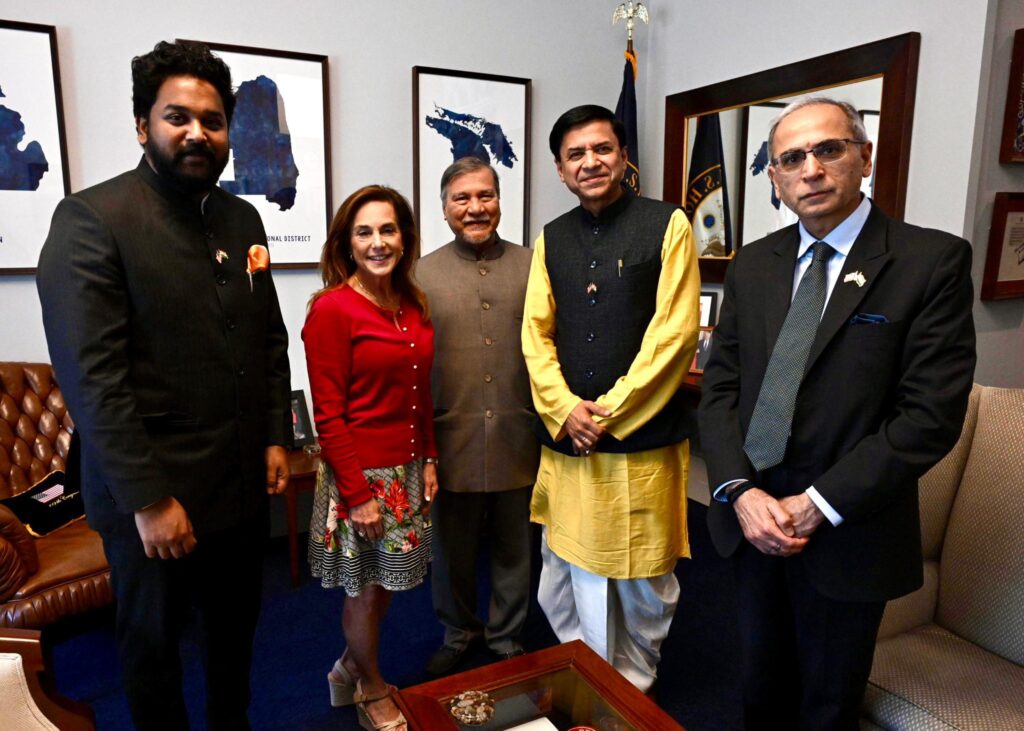
Tharoor was clear that the delegation was not attempting to “internationalize” the issue, but rather to deliver a message of “zero tolerance” toward terrorism. He stressed that mediation with Pakistan could not occur unless there was tangible progress in dismantling terrorist infrastructure and arresting individuals listed by the United Nations and the U.S. State Department.
On the question of hyphenating between India and Pakistan in global discourse, Tharoor was unequivocal in stating there can be no equivalence with a country sending terrorists and killing tourists on the basis of their religion.
“This kind of thing has been absolutely reprehensible, and outrageous,” he said. “This is not about India and Pakistan. This is about India and terrorism inflicted on India. So, India will act against terror wherever it comes from.”




